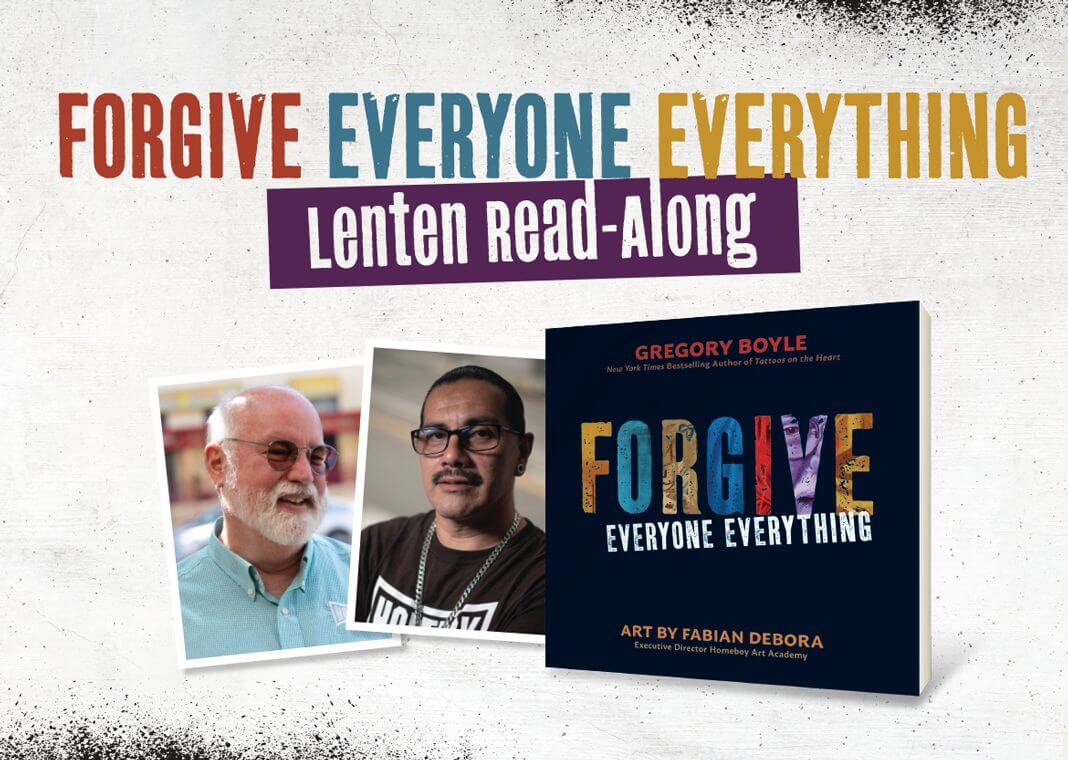I have long admired Gregory Boyle, SJ, whose books I regularly teach in my classes in the Boston College PULSE service learning program. I have had the opportunity to meet him a couple of times when he was on the lecture circuit, and he is the “real deal.” I’d call Boyle a living saint, except that I’m pretty sure that if I said so, he would maybe just nod and then remind me that we are all sacred in God’s eyes, all potential saints in the making. The point is never about Boyle himself, but whether, as he writes in his book, Forgive Everyone Everything, each one of us comes to know “the fullness of God and the solid goodness at your core” (40)—and to see this goodness in everyone else that we meet.
Boyle’s writings on his interactions with gang members in L.A. resonate with my own experiences as a person who has long-volunteered with a spirituality group at a state prison. Men and women who are incarcerated are not fundamentally different from the rest of us, in that we are all good and all capable of love. The key question is, What are the obstacles to realizing that this is true?
Early on in my time serving at the prison, I attended a Mass that was to be celebrated by the bishop. I was still relatively new and did not know many people there yet. After greeting some of the men for about half an hour, I sat down eager for the Mass. The service, however, was delayed. We waited, and we waited some more. As we waited, a fellow volunteer told me that the men had planned to engage in some liturgical movement based on the life of St. Dominic. I inwardly sighed, as at that time I was not always a fan of liturgical dance; my main experience of it had been high-school girls waving around pink and purple scarves during the procession. I kept my thoughts to myself and looked at the clock on the wall.
More people came by to say hello, but still no bishop. Word came through the chaplain that he was delayed. More time passed. All the volunteers started to get antsy, wondering what had happened. However, none of the inmates seemed noticeably bothered. Many were smiling and appeared calm and happy as they caught up with others. I commented to the man sitting next to me that they seemed to have a better attitude than we volunteers did. He replied, “Oh, we are used to things not happening on time. We are just grateful that everyone is here together. The bishop will show.”
I realized that the men had two virtues that I lacked in that moment: patience and an attentiveness to the graces of community that were already there. I felt momentarily ashamed of my own impatience and then decided to take the time to connect with others in the room. The community was still newish to me, but I had a chance to get to know others better, instead of feeling irritated with the delay.
The bishop finally did arrive and celebrated a beautiful Mass. The men engaged in liturgical dance prior to the service. Their dance demonstrated nine ways that St. Dominic had recommended as good postures for prayer—movements like bowing to God, genuflecting, and lying prostrate. The men turned prayer into a dance. But not just any dance. Men wearing their mandatory prison gear of t-shirts and jeans, many with brawny arms covered with tattoos, showed us the veneration of a bow, the delight of opening a book to pray, or the surrender of opening one’s arms, as if on a cross. Their movements communicated the goodness of having a body and reverence for God. Their dance communicated knowing something of the suffering of Jesus. I was deeply moved; this was worth the wait. I was the one who was being converted.
This was but one of many times that I learned something new from the men that I visit as a volunteer. I think that sometimes they also learn something from me. It is a two-way street, or really a three-way street, because God is always there as well.
Boyle’s book is not just for those who serve in prisons or only about service, for that matter. Rather, Forgive Everyone Everything is about being human. Boyle gives us the wisdom of being reminded that God’s invitation to us is to joy, and that being “courageously tender,” that is, being loving, is the “passport” to that joy. (29, 11)
Participating in our Lenten read-along of Forgive Everyone Everything? Introduce yourself in the comments below! And post your thoughts, favorite quotes, or reactions with #lentreadalong on social media.

